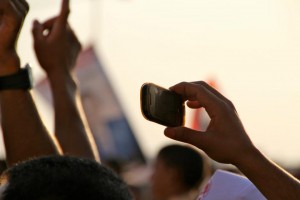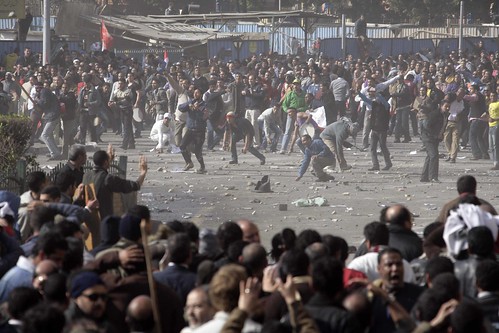What role did social media really play in Egypt’s Arab Spring uprising?
 The words ‘Facebook revolution’ come up in virtually every discussion of the protests and political upheavals that swept the Arabic world at the end of 2010 and early 2011. Opinion is still divided though about the exact role that social media played in sparking and sustaining the Arab revolutions. Now, in research that took her to Egypt to extensively interview activists involved in the uprising there, a DW Akademie International Media Studies student has some surprising conclusions on the topic. DW Akademie spoke to Eira Martens about her research.
The words ‘Facebook revolution’ come up in virtually every discussion of the protests and political upheavals that swept the Arabic world at the end of 2010 and early 2011. Opinion is still divided though about the exact role that social media played in sparking and sustaining the Arab revolutions. Now, in research that took her to Egypt to extensively interview activists involved in the uprising there, a DW Akademie International Media Studies student has some surprising conclusions on the topic. DW Akademie spoke to Eira Martens about her research.
In your master’s thesis, you explored the role of social media in the Egyptian revolution. Is it possible to say that Twitter and Facebook helped topple president Hosni Mubarak, who had ruled Egypt for 30 years?
You could say “yes”. My research results show that Twitter and Facebook played a significant role in the process of mobilizing protesters. In the Egyptian context, Facebook in particular helped accelerate the protests.
However, that doesn’t necessarily mean that the revolution wouldn’t have happened without these online platforms. The majority of the social media activists I interviewed believe that it would have taken a few more years to overthrow Mubarak’s government.
The virtual networks enabled the dramatic growth of what was initially a small protest movement. Especially in the year preceding the 18 days of mass protests in January and February 2011, the number of Facebook users increased rapidly. The Arab Social Media Report illustrates this numerical growth exceptionally well.
How does your research differ from the multitude of other studies on the topic?
In the past few years, there has been a great deal of hype surrounding social media and its role in the process of political transformation. Cyberoptimists and social media skeptics have been debating each other for years over the Twitter revolution and the Facebook effect.
The mass media has often pursued these debates in highly speculative ways. In light of this, in my master’s thesis I wanted to compile and analyze my own empirical data about what concrete roles social media platforms really played in the revolution in Egypt.
User statistics and network analysis clearly demonstrate the fundamental significance of certain social media tools in processes of political transformation. Previous studies indicated that there was a real need for studies on collective identity formation and organization mechanisms. I wanted to dig deeper and find out why and how people used social media to mobilize protests in a country like Egypt.
Which methodical approach did you use?
I conducted expert interviews in accordance with the method of qualitative content analysis developed by the social researcher, Philipp Mayring. This means, it was essential to use existing studies and theoretical assumptions as a starting point for my own methodological approach. The interviews I conducted were built on a clearly defined category system.
After transcribing the conversations I had in Egypt, I spent several weeks analyzing and structuring the large amount of text. This allowed me to explore key aspects, but also to identify variables and relationships between them which hadn’t been thought of so far..
In Egypt, what effect did social media have on the formation of collective identity?
During the course of the revolution, it was photos and videos more than anything, that helped develop a collective identity, or more precisely, helped develop a form of solidarity. In particular, images of police brutality and police assaults, which were distributed on Facebook and other platforms such as YouTube and Flickr, made people more willing to take to the streets and risk being injured or even killed. This is because as well making people more angry, the images also lowered people’s fear threshold.
Overall, social media networks made people feel as if they were part of a bigger protest movement. As a result, they could then collectively dare to move from the online world to the offline world, to the streets and public places of their country.
Your master’s thesis also explored the organizational aspects of the protests. What did you discover?
That it was the ‘real’ organizations such as the Muslim Brotherhood and the Ultras who played a central role in coordinating the mass protests in Egypt in January and February 2011. Social media had a very restricted role in this respect.
Some experts even believe that social media was responsible for causing chaos and anarchy. Activists don’t necessarily view this as something negative. People were being mobilized and wanted to actively contribute to political change. However, the organizational potential of Facebook and Twitter to coordinate protests in the long-term, to define collective goals and to create effective structures seems to be limited.
Essentially, there is a need to differentiate between the diverse functions that Facebook and other social media networks have. For example, when you discuss the organizational function of a specific platform, then you need to analyze the coordinating aspect and not the networking function or how it generates growth. Unfortunately, because people fail to define and specify concepts, they often reach non-scientific conclusions. As a result, the role of social media has been, and still is, often overestimated
The protesters in Egypt used many social media platforms, primarily Twitter and Facebook. Were these used in different ways?
That is a very important point because it is necessary to differential the roles of the individual platforms. Technical requirements alone meant that different platforms are used for different purposes.
While Facebook was used to exchange enormous amounts of audiovisual content and to form networks and discussion groups, Twitter was primarily used for logistical purposes in Egypt. For example, people exchanged information on how to deal with a tear gas attack. On the streets people could use Twitter to rapidly exchange information in real time about actual incidents.
That way, protesters could react quickly and evade attacks by security forces or bypass blockades. While the wider population used Facebook, it was primarily those activists who were extremely engaged that used Twitter inside and outside of Egypt.
You interviewed social media activists in Egypt. What kind of people are they?
I interviewed 10 social media experts in Cairo in total. The majority of them were young professionals of Muslim faith. Their average age was 25. The crucial factor for my research is that all of those I talked to had taken part in political protests both on the Internet as well on the streets during Egypt’s revolution.
Among others, I interviewed the marketing manager of a leading online news site, the head of a human rights organization, video journalists employed at a private television station and an editor at a state-run newspaper. By conducting research with people from a mix of traditional and new media, I had a broad spectrum of perspectives which enabled me to draw conclusions about the Egyptian media system in a wider sense.
Did the protest movement have leaders?
Interestingly, there are differing opinions about this. Even though the people I interviewed could themselves be considered central figures in the Egyptian protest movement, they don’t see themselves this way. Rather, if anything they are modest and prefer to stay in the background.
Fundamentally, this aspect is very controversial. Some believe that the protest, at least on the Internet, didn’t need any leaders and that the egalitarian forms of organization and communication of Facebook groups are decisive characteristics of social media.
Others believe that there were indeed so-called ‘leadership figures’ who were often created and highly stylized by the mass media. My interview partners mentioned famous bloggers, but also writers such as the Egyptian author Alaa Al-Aswani, who was also a spokesperson for the Kefaya movement.
How would you describe the relationship between social media and traditional media in Egypt?
There was a clear interplay between new and traditional media during the protests in Egypt. Instead of having to create their own content, traditional media, both within Egypt and in other countries, could access user-generated content produced by the protesters. And vice versa, the effect of social media was dependent on television and the daily newspapers because those people who didn’t or rarely use the Internet received the majority of their information from private television stations.
There was a five-day Internet blackout during the protests. The blackout can be interpreted in two ways. On the one hand, protesters still went out on the streets to demonstrate even though they had no Internet access. On the other hand, many believe that is was the social media blackout that caused people to be so angry that they went out and protested in every-increasing numbers.
Some of the experts I interviewed voiced their frustration about national and international reports on the revolution lacking neutrality. In contrast, the content posted on Facebook and other platforms was often viewed as being much more reliable. But also certain independent Egyptian newspapers such as El Shourouk, Al Masry Al Youm and Al Doustour were used as important channels of information.
Eira Martens is a recent graduate of the DW Akademie Master program in International Media Studies. After completing her first degree in Social and Economic Sciences with a major in Communication Science and International Relations from the Friedrich-Alexander University of Erlangen-Nuremberg, Martens worked for various NGOs and media organizations in Germany, Australia, South East Asia and Latin America. Most recently she was employed as a Junior Media Consultant at the German development organization, GIZ, in Nicaragua. Martens continues to contribute to academic research in the field of media development cooperation as research assistant at DW Akademie.





Feedback